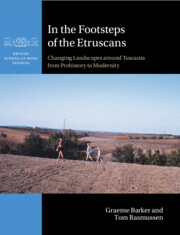Book contents
- In the Footsteps of the Etruscans
- British School at Rome Studies
- In the Footsteps of the Etruscans
- Copyright page
- Dedication
- Contents
- Figures
- Tables
- Contributors
- Preface and Acknowledgements
- 1 The Tuscania Archaeological Survey: Rationale, Aims and Objectives
- 2 Methodologies
- 3 The Natural Landscape and Its Evolution
- 4 Prehistoric Landscapes
- 5 Etruscan Urbanization, c. 700–300 bc
- 6 ‘Romanization’: The Roman Republican Period, c. 300–30 bc
- 7 The Roman Imperial and Late Antique Periods, c. 30 bc–c. ad 700
- 8 Incastellamento and Its Aftermath: Medieval and Modern Landscapes, c. ad 700 to the Present
- 9 A Mediterranean Landscape from Prehistory to Modernity
- Book part
- Bibliography
- Index
1 - The Tuscania Archaeological Survey: Rationale, Aims and Objectives
Published online by Cambridge University Press: 12 October 2023
- In the Footsteps of the Etruscans
- British School at Rome Studies
- In the Footsteps of the Etruscans
- Copyright page
- Dedication
- Contents
- Figures
- Tables
- Contributors
- Preface and Acknowledgements
- 1 The Tuscania Archaeological Survey: Rationale, Aims and Objectives
- 2 Methodologies
- 3 The Natural Landscape and Its Evolution
- 4 Prehistoric Landscapes
- 5 Etruscan Urbanization, c. 700–300 bc
- 6 ‘Romanization’: The Roman Republican Period, c. 300–30 bc
- 7 The Roman Imperial and Late Antique Periods, c. 30 bc–c. ad 700
- 8 Incastellamento and Its Aftermath: Medieval and Modern Landscapes, c. ad 700 to the Present
- 9 A Mediterranean Landscape from Prehistory to Modernity
- Book part
- Bibliography
- Index
Summary
The Tuscania Archaeological Survey investigated the archaeology of the countryside within a 10 km radius of the small town of Tuscania some 80 km northwest of Rome. The aim of the project was to contribute to present understanding of the processes that have shaped the development of the modern Mediterranean landscape as a physical and cultural construct. The specific research context of the project was debates about these processes in Etruria, the western side of central Italy that was the heartland of the Etruscan civilization in the mid first millennium BC: the character of prehistoric settlement prior to Etruscan urbanization; the relations between Etruscan towns and their rural populations; the impact on Tuscania and its landscape of being absorbed into the expanding Roman empire (‘Romanization’) and its economic structures after about 300 BC;the collapse of that system in the mid first millennium AD and the subsequent emergence of nucleated medieval villages (incastellamento); and the vicissitudes of peasant life through the political upheavals of medieval and post-medieval Italy. The chapter closes with an explanation of why we selected Tuscania and its intensively-farmed volcanic landscape as an ideal ‘laboratory’ for investigating this long-term landscape history, and how the project was planned.
Keywords
- Type
- Chapter
- Information
- In the Footsteps of the EtruscansChanging Landscapes around Tuscania from Prehistory to Modernity, pp. 1 - 27Publisher: Cambridge University PressPrint publication year: 2023



